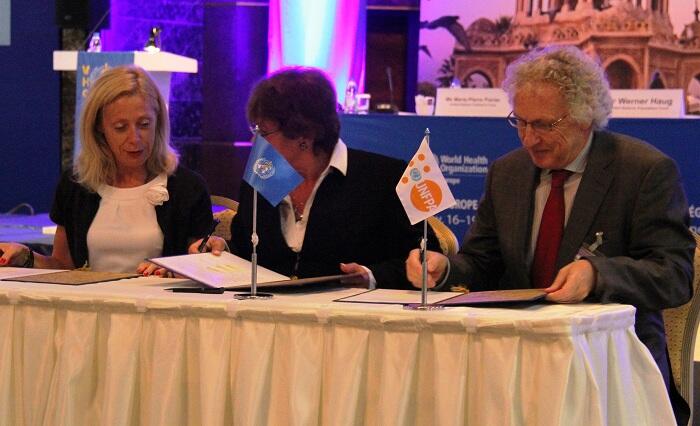Better collaboration to support Member States in Eastern Europe and Central Asia in achieving the health-related Millennium Development Goals is the goal of an agreement signed by the regional directors of UNFPA, the UN Population Fund, the World Health Organization (WHO) and UNICEF, the UN Children’s Fund, in the margins of a meeting of European health ministers on 18 September 2013.
“The overall sexual and reproductive health situation in the region is improving, but not all countries and not all population groups benefit from these improvements equally,” said Werner Haug, UNFPA’s Regional Director for Eastern Europe and Central Asia.
“With this agreement, we commit ourselves to work together more effectively and with a particular focus on the most under-served and vulnerable populations - women, children and adolescents in poverty, migrants, Roma and ethnic minorities, and people with disabilities,” Haug added.
In July, a high-level conference to review progress in implementing the Action Plan adopted by the landmark 1994 International Conference and Population and Development (ICPD) concluded that the region still faces many barriers and challenges. These include unacceptably high differences in mortality and morbidity between countries and between groups within countries; an incomplete agenda of gender equality and women’s empowerment; large inequalities in access to sexual and reproductive health information and services; and discrimination and social exclusion of migrants, minorities and other disadvantaged groups.
The agreement signed today will help us tackling these challenges and speed up progress towards achieving the Millennium Development Goals related to reducing maternal mortality, universal access to reproductive health, and universal access to treatment and care for people living with HIV, Haug said.
Zsuzsanna Jakab, WHO Regional Director, highlighted Health 2020, the recently adopted European Policy for health and well-being, as an agenda for action focusing on equity, greater empowerment of citizens and the life-course approach, and said strong coordination for synergy and coherence among UN agencies is “essential in reaching our common goals.”
Marie-Pierre Poirier, UNICEF Regional Director, stressed that the challenges faced in region “call for even more concerted efforts between partners, stronger partnerships for policy setting, innovation, knowledge generation and more active horizontal cooperation amongst countries.”



